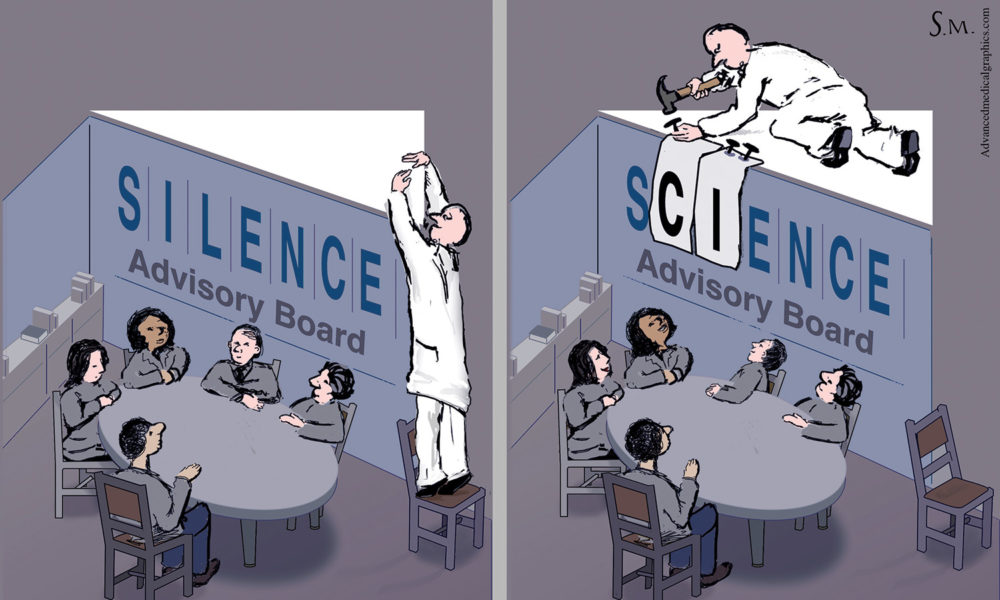Today marks an important day for Biden administration progress to restore independent science, as EPA Administrator Michael Regan announced that he would be “resetting” the membership on two of its science advisory committees, the Science Advisory Board (SAB) and the Clean Air Scientific Advisory Committee (CASAC). That’s a clear indication that Administrator Regan will make good on his and the President’s commitment to “listen to the scientists.”
EPA will now solicit nominations for a full slate of candidates for these committees. They are seeking qualified individuals who are free from conflicts of interest to help guide agency decisions on topics ranging from the safety of our drinking water to the necessary standards to protect people from air pollutants.
UCS spent four years under the Trump administration tracking the many process fouls, egregious breaks with precedent, and the massive corruption of science advisory panels across the government, particularly at EPA. We attended committee meetings, provided testimony at public comment sessions, and even hosted the reconvening of a disbanded committee to challenge the following attempts at EPA to undermine independent science advice:
- EPA Administrator Pruitt issued a directive barring individuals from serving on EPA science advisory committees if they are funded by an EPA grant, which resulted in the dismissal of many qualified experts. As a result, the number of academics serving on SAB dropped by 40 percent and industry representation tripled.
- Pruitt issued a memo changing the process by which CASAC informs the NAAQS standards, including expanding their consideration to non-scientific information.
- Pruitt disbanded the independent particular matter review panel and changed CASAC membership significantly so that it lacked epidemiological expertise.
- The administrator appointed industry consultant Louis Anthony “Tony” Cox Jr. to lead CASAC. EPA’s own staff advised against Cox’s appointment because of his financial conflicts of interest, lack of impartiality, and lack of relevant scientific expertise.
- Administrator Wheeler failed to reverse the grants directive in spite of a request from UCS and over 20 other organizations.
- Wheeler delayed asking SAB for advice on its flawed restricting-science (“transparency”) rule until it was nearly too late, and even then just asked for advice on a narrow piece of it.
- EPA disbanded two committees, including one science board (Environmental Laboratory Advisory Board) in response to the Trump administration’s executive order directing agencies to reduce advisory committees by one-third.
- Wheeler made the process by which SAB chooses to take on new advisory products more secretive and less democratic.
- After the 2017 grants directive was challenged in lawsuits filed by UCS, a coalition led by Earthjustice, and NRDC, and deemed illegal, EPA refused to reopen nominations for science committees to restore independence.
These changes hindered EPA’s ability to obtain independent science advice and fulfill its mission to protect public health using the best available science. In response, scientists raised their hands to fill in the gaps to help EPA make science-informed decisions, like the Independent Particulate Matter Review Panel, which was formed after being disbanded by Administrator Wheeler and provided its own scientific report to EPA. Now that EPA and the White House are doing an accounting and investigations of attacks on science from the past four years, it is important that science advice is valued and that damaged processes are fixed. With a slate of advisors that have been adequately vetted and an EPA that truly values objective science advice, these committees can come back stronger than ever and hopefully will mean there’s less work needed to hold the agency accountable for following its advisors’ recommendations.
A roadmap for rebuilding science advice
As part of President Biden’s January memo on scientific integrity, all agencies should be engaged in a 90-day review of their scientific advisory committees, ending in April. This includes asking questions like which should be reestablished and which processes should be updated to ensure that highly qualified experts, representing the “diversity of America,” can serve. As EPA undergoes this process and begins the nomination process for two of its key science committees, there are some important actions the agency can take not just to resolve Trump administration issues, but to strengthen and modernize its science advisory infrastructure.
We have issued recommendations on how the Biden administration EPA could help strengthen the integrity of advisory committees and rebuild public trust. For example, we recommend that EPA make its decisionmaking processes used for committee formation more open to the public, including how agencies screen members, how they assess committees for balance, how they plan to conduct outreach to solicit for more diverse membership, and how political officials are involved throughout the process. Importantly, a transparent vetting process and intentional outreach plans would ensure that expertise is prioritized, membership is more inclusive of different races, ethnicities, and genders, and that conflicts of interest or appearance of impartiality is avoided.
All agencies should also publish relevant basic information about each committee member on a public online portal (e.g., integrity.gov), including qualifications, background, employers, and funding sources for the previous five years, along with any conflict-of-interest waivers granted. These actions would help the public hold agencies accountable for ensuring the advice given by committee members is objective.
You can help reset EPA science advice!
The need to restore scientific integrity and science advice at EPA has never been greater. And now is the time to be a part of that transformation!
Nominations for SAB and CASAC will be accepted until May 3, so seize the day and nominate yourself or a peer if you match the qualifications listed in either of the calls for nomination (here and here). The nomination form is available here. Joining an advisory committee like SAB or CASAC is an incredibly powerful way to use your expertise to participate in science-based decisionmaking and help build science advice back better at EPA.

